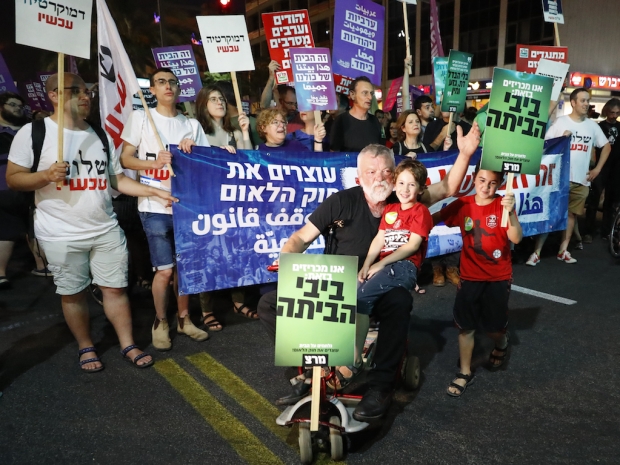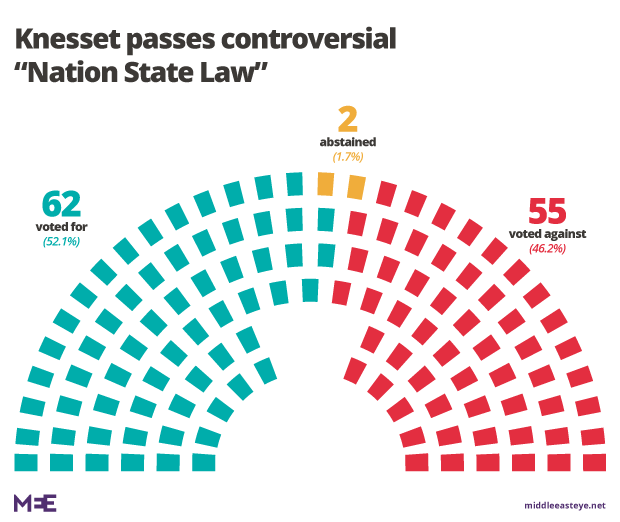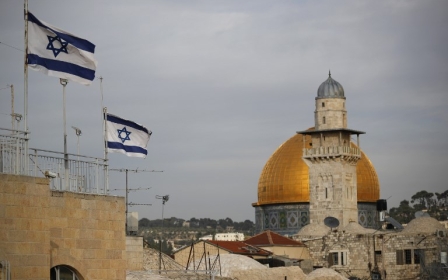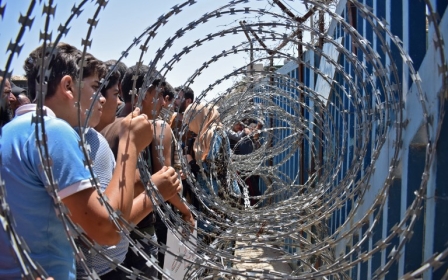Israel passes 'nation state' law enshrining Jewish supremacy

Israel passed a law on Thursday giving Jews supremacy over all non-Jewish Israeli citizens, which critics and members of the state's Palestinian minority called racist, likening the legislation to apartheid.
The "nation state" law passed by a vote of 62-55 and two abstentions in the 120-member parliament after months of political argument. Following the vote Palestinian lawmakers shouted and tore up papers.
Parliament Speaker Yuli-Yoel Edelstein called on security to eject the Palestinian MPs, who were led out crying "You are racist".
"This is a defining moment in the annals of Zionism and the history of the state of Israel," Prime Minister Benjamin Netanyahu told the Knesset, Israel's parliament, after the vote.
What is Israel's Nation State law?
- Less than 500 words in length, the law says Israel is the 'historical homeland' and the 'national home' of the Jewish people
- It says that only Jews have the right to exercise national self-determination in Israel
- It says that Jerusalem is Israel’s capital and Hebrew is its language
- It describes Jewish settlement as a 'national value' to be promoted by the state
Read in full: Israel's Nation State of the Jewish People Law
Hassan Jabareen, general director of Adalah, the Legal Centre for Arab Minority Rights in Israel, said the law features key elements of apartheid, which he said "is not only immoral but also absolutely prohibited under international law".
"The new law constitutionally enshrines the identity of Israel as the nation-state of the Jewish people only – despite the 1.5 million Palestinian citizens of the state and residents of East Jerusalem and the Golan Heights – and guarantees the exclusive ethnic-religious character of Israel as Jewish," he said.
"By defining sovereignty and democratic self-rule as belonging solely to the Jewish people – wherever they live around the world – Israel has made discrimination a constitutional value and has professed its commitment to favouring Jewish supremacy as the bedrock of its institutions.”
Mazin Qumsiyya, a writer and activist, told Middle East Eye that Israel was moving down a dark path.
"Colonial settler states like Israel move towards more and more extremism before they arrive at one of the three known outcomes of colonialism: the Algerian outcome (a two-tiered ethnic system), the Australian/USA outcome (genocide of natives), or the rest of the world model (coexistence in one pluralistic state)," he said.
"The nation state law is written mostly for self-validation by racists who know the third outcome is inevitably arriving soon."
Two tiers
Less than 500 words long, the nation-state law accords exclusive “national self-determination” rights – the right to decide Israel’s national priorities, of both symbolic and practical importance – to Jewish people, wherever they may live, in Israel or abroad, and whether or not they even hold Israeli citizenship.
The law does not, notably, say that Palestinian and other non-Jewish citizens of Israel are entitled to equal treatment under the law.
'Israel has made discrimination a constitutional value and has professed its commitment to favouring Jewish supremacy as the bedrock of its institutions'
- Hassan Jabareen, general director of Adalah
The law also gives Hebrew superior status over Arabic, making the former the state’s only official language and demoting the latter to merely a language with a “special status”.
In effect, the Nation State law, which as a basic law holds constitutional power, means Israel's ethno-religious character supersedes its democratic one.
The bill has been criticised by Palestinian citizens of Israel, liberal Jewish Israelis, Israel’s president and rights groups, some of whom have said the law would amount to apartheid.
“Twenty percent of the citizens will be discriminated against, by definition. What is that if not apartheid? This is racist and unprecedented legislation from a government that has lost all shame,” tweeted Joint List party chair Ayman Odeh earlier in the week, anticipating the law’s passage.
“This is a mortal wound for Arab citizens [of Israel], and for democracy, no less.”
Fellow Joint List lawmaker, Aida Touma-Suleiman, slammed the bill, saying it would “establish Jewish supremacy” and “wipe the word ‘equality’ from the political lexicon in the State of Israel.”
No country in the world today is defined as a democratic state where the constitutional identity is determined by ethnic affiliation that overrides the principle of equal citizenship
- Adalah
The Palestinian members of the Knesset, Israel’s parliament, were joined by Jewish liberal lawmakers and about 2,500 demonstrators on Saturday night, in a march through the main streets of downtown Tel Aviv to protest the bill.
Rights groups say Israel has been discriminating against its non-Jewish citizens ever since the state was founded in 1948, pointing to dozens of Israeli laws that mandate preferential treatment to Jews.
However, the law will have greater, more lasting impact as it enshrines a two-tiered system of rights in a basic law.
Coalition concessions
While Netanyahu’s government has ignored the protests of Palestinian parliamentarians and left-leaning Zionist lawmakers, it altered the law’s language in recent weeks in order to secure common ground between the centre-right and far-right factions of the cabinet.
The far-right religious bloc insisted on altering a clause committing the government to “strengthen the affinity between the state and the Jewish people,” ensuring that it would only apply to foreign Jews. The religious parties feared that if, as in its original language, the bill applied to Israeli Jews as well, it would legitimate liberal streams of the Jewish religion, and weaken their own monopoly on issues of synagogue and state.
The centre-right members of Netanyahu’s coalition government worried that, were the law to include language which could be easily understood as enshrining racial discrimination into law, it could further sour Israel’s relations with the world’s western democracies, who are still its most important international allies and largest trading partners.
One clause in particluar, 7b, had attracted much concern from Israel's allies and even its president, Reuven Rivlin.
Clause 7b would have allowed Jewish-only communities, and said the "state can allow a community composed of people of the same faith or nationality to maintain an exclusive community".
Rivlin condemned the clause, saying it would "allow any community to establish residential communities that exclude Sephardic Jews, ultra-orthodox people, Druze, LGBT people".
Under such pressure and encouraged by the centre right, 7b was removed, with the article concerning Jewish settlement changed to: "The state views the development of Jewish settlement as a national value and will act to encourage and promote its establishment and consolidation" - mandating state support for Jewish-only communities.
'This is a model of undisguised racism, suited only to corrupt rulers who have lost all shame'
- MK Dov Khenin
However, MK Dov Khenin from the Joint List indicated that the new wording, which was drafted by ultra-nationalist Naftali Bennet, is even worse than the original.
“While the earlier wording pretended to be neutral, stating that separate communities were possible for each group, now the cat is out of the bag and it’s stating explicitly that only Jewish communities will get priority," he said.
"This is a model of undisguised racism, suited only to corrupt rulers who have lost all shame.”
Prior to the law’s passing, over 900 locales in Israel – approximately three-quarters of all townships in the country – already forbade non-Jews from living within their municipal borders.
Sanctioning the state to diminish the property rights of Palestinian citizens of Israel is seemingly backed by widespread popular support. An Israel Democracy Institute poll published in November found that two-thirds of Israeli Jews believe that the right of Palestinian citizens of Israel to buy land in the country should be curtailed, while a quarter of Israeli Jews said any such purchases should be forbidden altogether.
In recent weeks, a family of Palestinian citizens of Israel who purchased a home in the northern city of Afula was protested by hundreds of locals, including the former mayor, who told local press, “'the residents of Afula don't want a mixed city, but rather a Jewish city, and it's their right. This is not racism.”
Adalah has panned the Nation-State law, saying it “discriminates against the Arabs in the fields of citizenship, property and land, language and culture, and justifies their inferiority in all spheres of life by excluding them from the political community that constitutes the sovereign in their homeland”.
“No country in the world today is defined as a democratic state where the constitutional identity is determined by ethnic affiliation that overrides the principle of equal citizenship,” the group said in a statement.
This article is available in French on Middle East Eye French edition.
Middle East Eye propose une couverture et une analyse indépendantes et incomparables du Moyen-Orient, de l’Afrique du Nord et d’autres régions du monde. Pour en savoir plus sur la reprise de ce contenu et les frais qui s’appliquent, veuillez remplir ce formulaire [en anglais]. Pour en savoir plus sur MEE, cliquez ici [en anglais].






